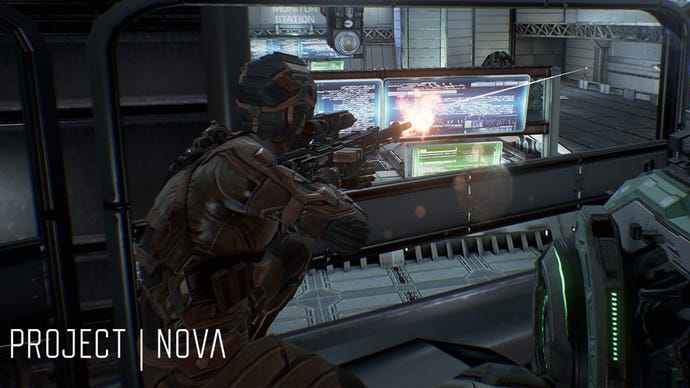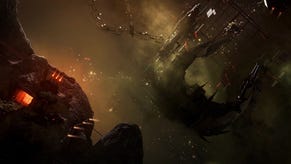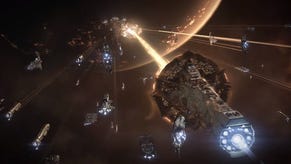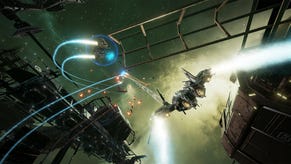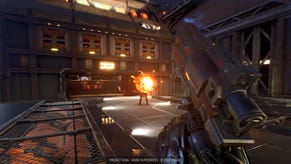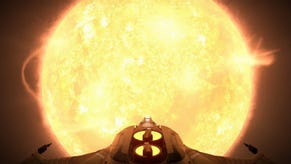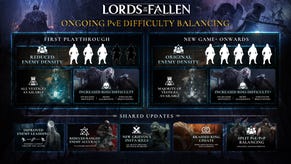An Eve Online first-person shooter is CCP's greatest folly
In beloved sci-fi comedy series The Hitchhiker’s Guide to the Galaxy, a man named Trin Tragula invents a machine to give the user a true sense of perspective. It does so by showing them a glimpse of the entire universe, and then marking the user’s position with a small sign that reads ‘you are here’.
The idea of an Eve Online FPS has the same enduring appeal. The Eve universe is enormous, and as close to real as virtual worlds get - players shape its economy and political landscape, and dominate it militarily with fleets of meticulously organised ships. To view that world from the ground, accessibly - to be able to influence it one tiny bit, and to feel its influence on you - would be irresistible.
It’s also a monumental challenge in design and tech; one that Eve developer CCP has been wrestling with in various forms across the world for more than ten years.
In the beginning, the game was called Dust 514. The fact that it was a PS3-only shooter gives you a sense of how long ago it was announced - a decade in real time, and a century in game development. CCP went big on the connection between its two games: Dust 514 players could make a significant noise in Eve Online by taking control of planets for powerful user-created corporations, and Eve Online players could aid their path to victory by bombing Dust maps from orbit. The idea of firing a beam from one game to another was a wild, astonishing prospect, and it still is.
But even the most fascinating metagame is no substitute for the moment-to-moment joy of a great shooter, and Dust was lacking where it mattered. It came out just months before Battlefield 4, and CCP couldn’t compete with DICE on the punch of its guns or the purposeful flow of its maps. Most Eve Online players, firmly rooted on PC, failed to engage with the new possibilities, and orbital strikes became rare as unicorn turds.
When the developer’s Shanghai studio attempted to port Dust to PC, they found that the very thing distinguishing it from other shooters - the code behind its dynamic landscapes and connection with Eve - had killed it. The game was too far divorced from Unreal Engine 3 to optimise or update, and the project was abandoned. Once the PS4 took off, Dust was doomed.
CCP learned lessons from Dust, but perhaps took them too much to heart. Its successor, Project Nova, was focused on the basics - twitch gunplay in tight arenas with weighty weapons. But the version I played at a celebratory Eve Fanfest a few years ago, just down the road from CCP’s Reykjavik HQ, betrayed no sense of a world beyond its corridors. Disconnected from the dream of a connected Eve universe, it was simply dull - another deathmatch shooter with no clear reason to exist.
“If we do continue the project, make it a product and start supporting it with all the CCP resources, then it becomes a game [with] a long tail, expansions, Eve connections and all those things,” senior director Snorri Árnason told me at the time. “But first we want to hear, ‘I had fun.’”
Unfortunately, CCP heard the opposite. A planned alpha was cancelled, and the story probably should have ended there. Instead, the developer has clung tight to its dream, announcing a new Eve FPS in the works at its London studio just last week.
“We’re continuing to develop our sci-fi multiplayer shooter game concept, actively evolving it beyond the original scope for what was formerly codenamed Project Nova,” head of PR George Kelion said in a statement. “We remain committed to offering a rock-solid, action-oriented gameplay experience with stellar visuals.”
It’s not as if CCP is incapable of making rock-solid action. VR fans will tell you that Eve: Valkyrie is a dogfighting sim with an incredible sense of cinema. The little-known Sparc, meanwhile, made Tron disc-throwing a thrilling reality. I’ll always cherish the memory of my Fanfest sessions with it, ducking, diving and taunting opponents in full-body motion.
But as the small size of VR’s niche became clear in 2017, CCP shut down the two offices responsible for those games, in Newcastle and Atlanta. The newer London studio behind the next iteration of the Eve FPS is unproven, which makes the quality of its output difficult to predict.
In The Hitchhiker’s Guide to the Galaxy, the Total Perspective Vortex winds up killing those who are subjected to it. The true scope of the universe turns out too vast to comprehend, and the machine is repurposed as a torture device. Maybe the Eve FPS, too, is a wonderful idea with a scope that’s simply beyond our ability to properly conceive or appreciate.
